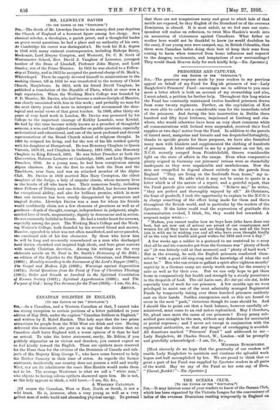MR. LLEWELYN DAVIES
[To THE EDITOR OP THE "SPECTATOR."] Prn,--The death of Mr. Llewelyn Davies in his ninety-first year deprives the Church of England of a foremost figure among her clergy. As a classical scholar, a theologian, a parish priest, and a thoughtful leader on grave social questions, he had a place and an authority of his own. At Cambridge his career was distinguisLel. He took his B.A. degree in 1848 with many eminent contemporaries, including Bishops Barry, Mackenzie, Lord Alwyn Compton, and Weatcott, Dr. C. B. Scott of Westminster School, Rev. David J. Vaughan of Leicester, youngest brother of the Dean of Llandaff, Professor John Mayor, and Lord Stanley, son of the Prime Minister. In 1851 he was elected to a Fellow- ship at Trinity, and in 1853 he accepted the pastoral charge of St. Mark's, Whitechapel. There he eagerly devoted himself to ministrations to the working classes, till in 1856 he was transferred to the rectory of Christ Church, Marylebone. In 1852, with his friend David Vaughan, he published a translation of the Republic of Plato, which at once won a high reputation. When the Working Men's College was founded by P. D. Maurice, Mr. Davies, who had become a zealous disciple of Maurice, was closely associated with him in this work ; and probably no man for the next thirty years did more to interpret and recommend the theo- logical and social views of that great teacher. In-1889, after thirty-six years of very hard work in London, Mr. Davies was presented by his College to the important vicarage of Kirkby Lonsdale, near Kendal. Me had by this time become widely known as a preacher of thoughtful
e ermons, a wise and far-sighted counsellor on public questions, especially
e cclesiastical and educational, and one of the most profound and devout representatives of the Broad Church school of religious thought. In 1,968 he resigned his living, and for the rest of his life resided quietly with his daughter at Hampstead. He was Honorary Chaplain to Queen Victoria, 1876-81, and Chaplain in Ordinary, 1881-1901, also Honorary Chaplain to King Edward, 1901. He was Select Preacher at both the Universities, Hulsean Lecturer at Cambridge, 1890, and Lady Margaret Preacher, 1900. As a young man, he had been conspicuous among Alpine climbers. He was the first to scale both the Dom and the Tisehhorn, near Sass, and was an attached member of the Alpine Club. Mr. Davies in 1859 married Miss Mary Crompton, the eldest daughter of the Judge, a lady of singular charm, whose memory lives in the hearts of all who knew her. Their numerous family, including three Fellows of Trinity and one Scholar of Bailie], has become known far exceptional ability, and also for brilliant promise, which in more than one instance has been cruelly disappointed by premature and tragical deaths. Llewelyn Davies was a man for whom his friends would confidently claim not a few elements of greatness as well as of goodness—depth of thought, courage, independence in judgment, single- minded love of truth, magnanimity, dignity in demeanour and in action. He was eminently faithful to friends. He had a tender heart for sorrows, especially among the poor. The Working Men's College and the Work- ing Women's College, both founded by his revered friend and master, Maurice, appealed to what was not often manifested, and never paraded, the emotional side of his fine character. By those who knew him he will be long and reverently remembered as a man who discharged hard duties, cherished and inspired high ideals, and bore great sorrows with manly Christian devotion. Among his writings are the very elaborate article on St. Paul in Dr. Smith's Dictionary of the Bible ; ea edition of the Epistles to the Ephesians, Colossians, and Philemon (1866) ; Morality according to the Sacrament of the Lord's Supper (1867); The Gospel and Modern Life (1869) ; Warnings against Superstition (1874); Social Questions from the Point of View of Christian Theology (1685) ; Order and Growth as Involved in the Spiritual Constitution 4 Human Society (1891) ; Spiritual Apprehension (1898) ; and The Purpose of God : being Ten Sermons for the Time (1910).—I am, Sir, &c.,
Amicvs.






























 Previous page
Previous page